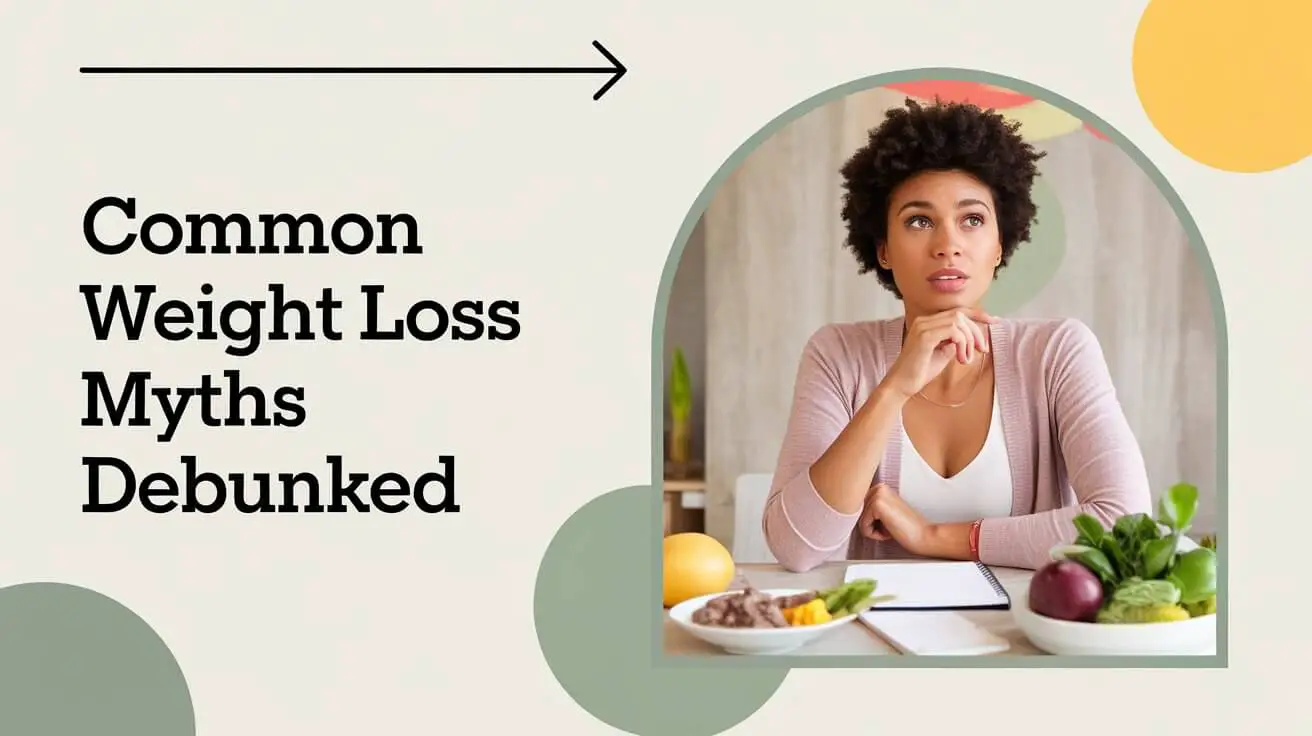If you are trying to lose weight, you may have come across countless tips and tricks that promise quick results. The truth is, many of these so-called “facts” are actually weight loss myths that can mislead you and hinder your progress. When I started my own weight loss journey, I believed several of these myths and learned the hard way that they don’t work.

In this article, I’ll debunk some of the most common weight loss myths and share what actually works, so you can focus on making sustainable changes for a healthier life.
Myth 1: Skipping Meals Helps You Lose Weight
The Truth: Skipping meals often backfires. While it might seem like eating less will help you lose weight faster, skipping meals can slow your metabolism and increase hunger later in the day. This often leads to overeating or unhealthy food choices.
My Experience: I used to skip breakfast thinking it would save calories, but by lunchtime, I was so hungry that I overindulged. When I started eating balanced meals regularly, I noticed I had more energy and fewer cravings.
Myth 2: Carbs Are the Enemy
The Truth: Not all carbs are bad. While refined carbs like white bread and sugary snacks can lead to weight gain, complex carbs like whole grains, fruits, and vegetables are essential for energy and overall health.
Why It Matters: Your body needs carbs for fuel, and cutting them out entirely can leave you feeling tired and irritable.
My Approach: Instead of cutting carbs completely, I focused on eating whole grains and limiting processed foods. This made a huge difference in my energy levels and weight management.
Myth 3: Fat Makes You Fat
The Truth: Healthy fats are an important part of a balanced diet. Foods like avocados, nuts, seeds, and olive oil provide essential nutrients and help keep you full longer.
What to Know: It’s about the type and quantity of fat you consume. Avoid trans fats and limit saturated fats, but don’t shy away from healthy fats.
Tip: I include a handful of almonds or a drizzle of olive oil in my meals to stay satisfied without overindulging.
Myth 4: You Can Spot-Reduce Fat
The Truth: Targeting specific areas for fat loss, like doing endless sit-ups for a flat stomach, doesn’t work. Fat loss happens throughout the body and is influenced by overall calorie burn and genetics.
What Works: Combining regular exercise with a healthy diet is the most effective way to lose fat overall.
Personal Note: I spent weeks doing ab workouts expecting a flat stomach, but I only saw results when I combined strength training, cardio, and better eating habits.
Myth 5: Eating After 8 PM Causes Weight Gain
The Truth: Weight gain isn’t about when you eat, but rather how much you eat. Late-night snacking can contribute to weight gain if it leads to overeating or choosing high-calorie, low-nutrient foods.
What to Do: Focus on total daily calorie intake and avoid mindless snacking in the evenings.
My Strategy: I make sure my dinner is satisfying so I’m not tempted to snack before bed.
Myth 6: You Have to Exercise for Hours Every Day
The Truth: Consistency is more important than duration. Even short workouts can be effective if done regularly. Overtraining can lead to burnout or injury, making it harder to stay active in the long run.
What Works: A combination of cardio, strength training, and flexibility exercises done 3–5 times a week is ideal.
My Routine: I started with 20–30 minutes of walking or home workouts, and it was enough to see progress without feeling overwhelmed.
Myth 7: Supplements and Detox Teas Are Essential for Weight Loss
The Truth: Most supplements and detox teas promise quick fixes but often lack scientific evidence. They can be expensive, and some even have harmful side effects.
What to Focus On: A balanced diet and regular exercise are the real keys to sustainable weight loss.
My Experience: I wasted money on a popular detox tea only to realize that staying hydrated and eating more fruits and vegetables were far more effective.
Myth 8: Weight Loss Is Only About Eating Less
The Truth: Weight loss is about creating a calorie deficit, but that doesn’t mean starving yourself. Quality matters just as much as quantity. Eating nutrient-dense foods helps you feel full and supports your health.
What to Do: Focus on whole, unprocessed foods and avoid extreme calorie restriction, which can slow your metabolism.
My Learning: When I shifted my focus from eating less to eating better, I started losing weight and felt much healthier.
Myth 9: The Scale Is the Only Measure of Progress
The Truth: Weight fluctuates daily due to factors like water retention, hormones, and digestion. The scale doesn’t always reflect fat loss or muscle gain.
What to Track: Pay attention to how your clothes fit, your energy levels, and how strong you feel during workouts.
My Journey: I stopped obsessing over the scale and started celebrating non-scale victories, like being able to run longer or lift heavier weights.
Myth 10: Weight Loss Has a One-Size-Fits-All Solution
The Truth: Everyone’s body is different. What works for one person may not work for another. Factors like age, gender, genetics, and lifestyle all play a role in weight loss.
What to Remember: Experiment with different approaches and focus on what makes you feel good and fits your lifestyle.
My Realization: I tried several diets and workout plans before finding a balance that worked for me.
Conclusion
Weight loss myths can be confusing and frustrating, but understanding the truth behind them can help you make better choices. Sustainable weight loss is about consistency, balance, and finding what works for your body and lifestyle.
From my experience, focusing on simple, realistic habits like eating nutritious foods, staying active, and managing stress made a huge difference. Avoid falling for quick fixes or trendy advice, and remember that progress takes time. By staying informed and patient, you can achieve your weight loss goals in a healthy way.
